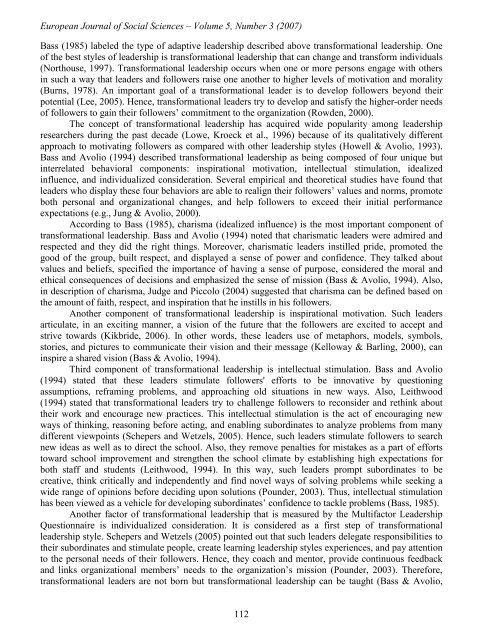european journal of social sciences issn: 1450-2267 - EuroJournals
european journal of social sciences issn: 1450-2267 - EuroJournals
european journal of social sciences issn: 1450-2267 - EuroJournals
Create successful ePaper yourself
Turn your PDF publications into a flip-book with our unique Google optimized e-Paper software.
European Journal <strong>of</strong> Social Sciences – Volume 5, Number 3 (2007)<br />
Bass (1985) labeled the type <strong>of</strong> adaptive leadership described above transformational leadership. One<br />
<strong>of</strong> the best styles <strong>of</strong> leadership is transformational leadership that can change and transform individuals<br />
(Northouse, 1997). Transformational leadership occurs when one or more persons engage with others<br />
in such a way that leaders and followers raise one another to higher levels <strong>of</strong> motivation and morality<br />
(Burns, 1978). An important goal <strong>of</strong> a transformational leader is to develop followers beyond their<br />
potential (Lee, 2005). Hence, transformational leaders try to develop and satisfy the higher-order needs<br />
<strong>of</strong> followers to gain their followers’ commitment to the organization (Rowden, 2000).<br />
The concept <strong>of</strong> transformational leadership has acquired wide popularity among leadership<br />
researchers during the past decade (Lowe, Kroeck et al., 1996) because <strong>of</strong> its qualitatively different<br />
approach to motivating followers as compared with other leadership styles (Howell & Avolio, 1993).<br />
Bass and Avolio (1994) described transformational leadership as being composed <strong>of</strong> four unique but<br />
interrelated behavioral components: inspirational motivation, intellectual stimulation, idealized<br />
influence, and individualized consideration. Several empirical and theoretical studies have found that<br />
leaders who display these four behaviors are able to realign their followers’ values and norms, promote<br />
both personal and organizational changes, and help followers to exceed their initial performance<br />
expectations (e.g., Jung & Avolio, 2000).<br />
According to Bass (1985), charisma (idealized influence) is the most important component <strong>of</strong><br />
transformational leadership. Bass and Avolio (1994) noted that charismatic leaders were admired and<br />
respected and they did the right things. Moreover, charismatic leaders instilled pride, promoted the<br />
good <strong>of</strong> the group, built respect, and displayed a sense <strong>of</strong> power and confidence. They talked about<br />
values and beliefs, specified the importance <strong>of</strong> having a sense <strong>of</strong> purpose, considered the moral and<br />
ethical consequences <strong>of</strong> decisions and emphasized the sense <strong>of</strong> mission (Bass & Avolio, 1994). Also,<br />
in description <strong>of</strong> charisma, Judge and Piccolo (2004) suggested that charisma can be defined based on<br />
the amount <strong>of</strong> faith, respect, and inspiration that he instills in his followers.<br />
Another component <strong>of</strong> transformational leadership is inspirational motivation. Such leaders<br />
articulate, in an exciting manner, a vision <strong>of</strong> the future that the followers are excited to accept and<br />
strive towards (Kikbride, 2006). In other words, these leaders use <strong>of</strong> metaphors, models, symbols,<br />
stories, and pictures to communicate their vision and their message (Kelloway & Barling, 2000), can<br />
inspire a shared vision (Bass & Avolio, 1994).<br />
Third component <strong>of</strong> transformational leadership is intellectual stimulation. Bass and Avolio<br />
(1994) stated that these leaders stimulate followers' efforts to be innovative by questioning<br />
assumptions, reframing problems, and approaching old situations in new ways. Also, Leithwood<br />
(1994) stated that transformational leaders try to challenge followers to reconsider and rethink about<br />
their work and encourage new practices. This intellectual stimulation is the act <strong>of</strong> encouraging new<br />
ways <strong>of</strong> thinking, reasoning before acting, and enabling subordinates to analyze problems from many<br />
different viewpoints (Schepers and Wetzels, 2005). Hence, such leaders stimulate followers to search<br />
new ideas as well as to direct the school. Also, they remove penalties for mistakes as a part <strong>of</strong> efforts<br />
toward school improvement and strengthen the school climate by establishing high expectations for<br />
both staff and students (Leithwood, 1994). In this way, such leaders prompt subordinates to be<br />
creative, think critically and independently and find novel ways <strong>of</strong> solving problems while seeking a<br />
wide range <strong>of</strong> opinions before deciding upon solutions (Pounder, 2003). Thus, intellectual stimulation<br />
has been viewed as a vehicle for developing subordinates’ confidence to tackle problems (Bass, 1985).<br />
Another factor <strong>of</strong> transformational leadership that is measured by the Multifactor Leadership<br />
Questionnaire is individualized consideration. It is considered as a first step <strong>of</strong> transformational<br />
leadership style. Schepers and Wetzels (2005) pointed out that such leaders delegate responsibilities to<br />
their subordinates and stimulate people, create learning leadership styles experiences, and pay attention<br />
to the personal needs <strong>of</strong> their followers. Hence, they coach and mentor, provide continuous feedback<br />
and links organizational members’ needs to the organization’s mission (Pounder, 2003). Therefore,<br />
transformational leaders are not born but transformational leadership can be taught (Bass & Avolio,<br />
112

















